|
|
|
|
|
|
|
An Analysis of Serbia’s
Right-Wing Attitudes
EXTREMISM:
DESTRUCTION OF
DEMOCRACY AND
ETHNO-CONFESSIONAL
POLITICS
Helsinki Committee for
Human Rights in
Serbia Belgrade, 2024. |
 |
Over the last few years, right-wing, populist and extremist
populist parties and politicians have
become an important factor
in the Western Hemisphere and, in many cases, they have come to
power or entered institutions (either as the opposition in
parliaments or as partners in the executive branch of power). In
Serbia, this...
Acrobat PDF (561kb) >>> |
|
|
|
GENDER ASPECTS OF
EXTREMISMS IN SERBIA
Helsinki Committee for
Human Rights in
Serbia Belgrade, 2024. |
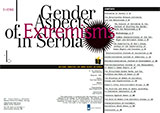 |
In
recent decades, extremism has become a ubiquitous and serious
global problem. However, one aspect of extremism, which often
remains unexplored or insufficiently understood, is the role of
gender in shaping and fueling extremist
ideologies. As the key
component of the social structure, gender can give special
insights into the forms and causes of extremism, as well as the
necessary interventions. Gender is a fundamental category of the
social...
Acrobat PDF (640kb) >>> |
|
|
|
Sandžak Bosniaks
BETWEEN EXTREMISM
AND FIGHTING FOR
RESPECT
FOR HUMAN
AND MINORITY RIGHTS
Helsinki Committee for
Human Rights in
Serbia Belgrade, 2024. |
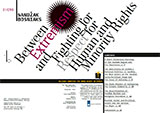 |
The Sandžak region is located in the southwest of Serbia.
According to the 2022 census, the six Sandžak municipalities
have 233,091 inhabitants of whom 150,941 declared themselves as
Bosniaks, 62,478 as Serbs and 6,433 as Muslims.1 The largest
city in Sandžak is Novi Pazar with 106,720 inhabitants. It is
followed by Tutin with 33,053 inhabitants, Prijepolje...
Acrobat PDF (400kb) >>> |
|
|
|
|
Serbian Orthodox
Church – Politics, Actors,
and Activities
NATIONALIST SPIRITUAL
VERTICAL
Helsinki Committee for
Human Rights in Serbia Belgrade, 2024. |
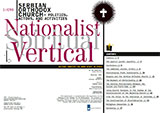 |
The Serbian Orthodox Church (SPC) is one of the most significant
political figures in the post-Yugoslav space over the past four
decades. This study exposes the ideology and...
Acrobat PDF (557kb) >>> |
|
|
|
|
|
Helsinki Committee for
Human Rights in Serbia
DEFENDERS OF HUMAN
RIGHTS IN SERBIA
Belgrade, December 2023. |
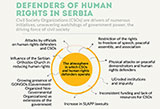 |
This report is produced within the project "Challenging the
shrinking space for Civil Society in the Western Balkans" funded
by the Ministry of Foreign Affairs of the Federal Republic of
Germany. The contents of this report are the sole responsibility of
the Helsinki....
More >>> |
|
|
|
Helsinki Committee
Report 2022/2023
SERBIA: CAPTURED
SOCIETY
Belgrade, 2023. |
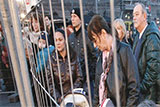 |
Serbia is at a historical crossroads. Due to the confluence of
his torical circumstances and the tragedy of what is happaning
in Ukraine, the Balkans are once again themselves in the focus
of the international Western community, primarily as a...
Acrobat PDF (2.08mb) >>> |
|
|
|
|
Helsinki Committee for
Human Rights in Serbia
SANDŽAK: REGION OF
CONTROLLED TENSIONS
Belgrade, 2021. |
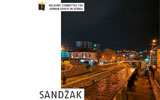 |
Sandžak is the border and cross-border region of Serbia and
Montenegro, extending from northern Kosovo to the Republic of
Srpska, that is, Bosnia and Herzegovina. It covers an area of
8,409 sq.km of which 4,504 sq.km are in Serbia and 3,905 sq.km...
Acrobat PDF (1.66mb) >>> |
|
|
ALBANIAN MINORITY
ON HOLD
Preševo, Bujanovac and
Medveđa as hostages
of
the
Serbia and Kosovo
relations
Belgrade, 2021.
|
 |
The Albanian community in Southern Serbia is one of three
minority communities (the other two being
Bosniaks and Hungarians) and is territorially compact and
located along the border (with North Macedonia and Kosovo)...
Acrobat PDF (1.32mb) >>> |
|
|
Report on Human Rights
in Serbia in 2014
POLITICAL CULTURE VS.
EUROPEANIZATION
Belgrade, 2015 |
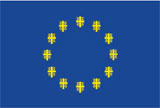 |
Serbia is once again at crossroad that calls for the engagement
of its entire society. The steps the
government has made
toward
EU accession are insufficient, the more so
since the government
itself is not unanimous about...
Acrobat PDF (779kb) >>> |
|
|
|
PRIMORDIAL RESISTANCE
TO LIBERAL VALUES
- 2013 Annual Report -
Belgrade, July 2, 2014
Acrobat PDF (428kb) >>> |
 |
The Helsinki Committee
has issued its 14th annual
report on
the situation of human rights in Serbia against the
backdrop of political,
economic and social
developments. The report
notes that 2013 saw no progress in the domain of human...
More >>> |
|
|
|
|
|
|
|
PRISONS IN SERBIA
February - March, 2010
Monitoring of the prison system reform
Improvement of the penal system preconditions the
establishment of a safer
and saner society and is a major aspect of
Serbia's undergoing judiciary
reform. In the context of human
security, this segment of the judiciary reform is the more so
significant since it directly relates to global processes and
international law. At the same time, treatment of persons deprived
of their liberty is regulated under...
Acrobat PDF (1.45mb) >>> |
|
State Department, USA
2009 HUMAN RIGHTS REPORT: SERBIA
March 11, 2010
The Republic of Serbia is a parliamentary
democracy with approximately 7.5 million inhabitants. Boris Tadic
was reelected president in February 2008. In May 2008 voters elected
a new parliament in which some minority ethnic
parties won seats.
Observers considered both elections to be mostly in
line with
international standards. Civilian authorities generally maintained
effective...
MS Word (181kb) >>> |
|
POST - 2000 OCTOBER MEDIA SITUATION IN SERBIA
Izabela Kisic,
Seska Stanojlovic |
 |
The
5 October 2000 ouster of Slobodan Milosevic did not mark the
break with a decade-long policy he had embodied. On the
contrary, ideological masterminds of the Greater Serbia project
(influential intellectual circles rallied around the...
MS Word (340kb) >>> |
|
|
|
|
|
WHAT WE ACCOMPLISHED IN 2008
In setting our priorities for 2008 we were aware
that any serious concern with human rights in Serbia presupposed
continued observation and analysis of the developments, tendencies
and factors influencing the country's reformist potential and
democratic transition, "standardization" of public life, response to
transitional justice, major decision-makers' readiness to take it
towards Euro-Atlantic integration and the...
MS Word (55kb) >>> |
|
2008
HUMAN RIGHTS REPORT: SERBIA
Bureau of Democracy, Human Rights, and Labor
February 25, 2009
The Republic of Serbia is a parliamentary
democracy with approximately 7.5 million inhabitants. Boris Tadic
was reelected president on February 3. On May 11, voters elected a
new parliament, with some minority ethnic parties winning seats.
Observers deemed both elections to
be mostly in line with
international standards...
MS Word (170kb) >>> |
|
REPORT BY THE COMMISSIONER FOR HUMAN RIGHTS, THOMAS HAMMARBERG, ON
HIS VISIT TO SERBIA
(13-17 October 2008)
Strasbourg,
11 March 2009
The Commissioner for Human Rights visited
Serbia
from 13 to 17 October 2008 for an assessment of the overall human
rights situation. Despite steps in the right direction, a number of
obstacles remain to the effective implementation of human rights
standards. Serbia has...
More >>> |
|
|
|
|
ALL REPORTS |
PAGE 1 ::: 1 | 2 |
3 | 4 |
|
|
|
|
